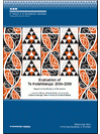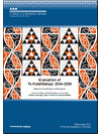In 2007, Victoria University was contracted by the Ministry to produce an external evaluation of the effectiveness of Te Kotahitanga. It is the first external evaluation of Te Kotahitanga. This is the full technical report of the evaluation of Te Kotahitanga in 22 schools from phase three and four of the programme, from 2004 – 2008. Substantive findings from the evaluation report concluded that Te Kotahitanga is a sound and effective process for improving classroom teaching and learning for Māori students.
Purpose
The main research question for this evaluation is "How well and in what ways does Te Kotahitanga work towards the goal of improving Māori student achievement?" To address this question, the evaluation was designed specifically to answer the following sub-questions:
- What is the quality of the overall design, content and implementation of Te Kotahitanga?
- How valuable are the outcomes for the teachers who participate—what new knowledge, understandings and skills do they develop, and how valuable are these learnings?
- How valuable are the outcomes for Māori students, and what is the impact on other classmates/peers?
- How valuable are the outcomes for whānau?
- How beneficial (or detrimental) are the effects of Te Kotahitanga on school culture (covering any changes in formal systems and policies; informal practices, or “the way we do things around here”; and underlying beliefs, values, assumptions and attitudes)?
- What are the enablers and barriers for getting Te Kotahitanga to work most effectively?
- To what extent is Te Kotahitanga likely to work effectively in other settings and contexts? How sustainable is the initiative likely to be when ministry investment of resources is scaled back?
- What are the most critical factors in improving teacher efficacy?


